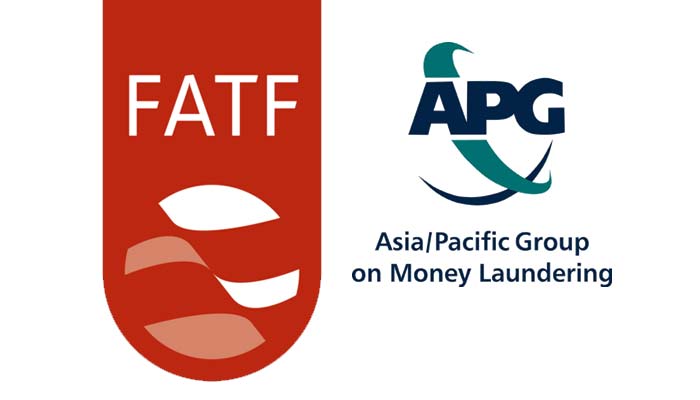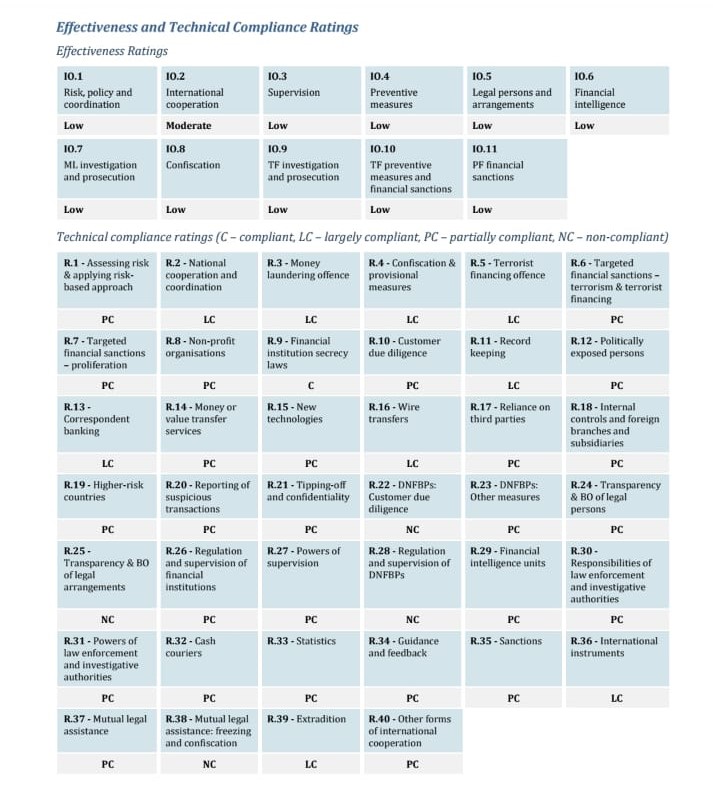The Asia/Pacific Group on Money Laundering (APG) has published its report on money-laundering and terror-financing in Pakistan.
The report states that Pakistan’s progress has been quite slow, partially, largely or completely complying with 36 of the 40 parameters set by the FATF. However, the Effectiveness rating has been marked as poor, as Pakistan received a “Low” rating for 10 out of 11 parameters.
According to the Mutual Evaluation Report (MER), Pakistan was fully compliant in one of the parameters, was largely compliant on 9, partially compliant on 26 and was non-compliant on four of the total 40 recommendations of the APG on the effectiveness of the anti-money laundering and combating terror financing.
In October 2018, an APG team had come to Pakistan to assess the effectiveness of Pakistan’s AML/CFT regime under FATF methodology. The new APG evaluation report draws heavily on the report issued after that visit.
This report will be used by the FATF in an upcoming Paris meeting scheduled for October 13-18, keeping in view Pakistan’s compliance with the parameters.
Non-Compliant Parameters
The four missed parameters were:
- DNFBPs (designated non-financial businesses and profession): Customer due diligence.
- Transparency & BO (beneficial owner/ownership) of legal arrangements.
- Regulation and supervision of the DNFBPs.
- Mutual legal assistance: freezing and confiscation.
The report stated that Pakistan had assigned a national risk-rating of ‘medium’ for both ML (money laundering) and TF (terror financing), but its national risk assessment lacked a comprehensive analysis. It said the authorities had varying levels of understanding of the country’s ML and TF risks, and the private sector had a mixed understanding of risks.
“While Pakistan has established a multi-agency approach to implementing its AML/CFT regime, it is not implementing a comprehensive and coordinated risk-based approach to combating ML and TF,” it added.
It further said that Pakistan is using financial intelligence to combat ML, TF, predicate crimes and to trace property for confiscation purposes but only to a minimal extent. Critically, the FMU cannot disseminate information on request and the results of its analysis to provincial CTDs, which are designated as TF investigation authorities. To a minimal extent, CTDs are accessing FMU information and financial intelligence during TF investigations but only with permission of the court.
Pakistan’s law enforcement agencies (LEAs) undertook 2,420 ML investigations, resulting in 354 prosecutions (primarily self-laundering cases) and the conviction of one person for self-laundering related to corruption. Proportionality and dissuasiveness of the sanction against natural persons could not be assessed due to a lack of information. Pakistan’s law enforcement efforts to address ML are not consistent with its risks.
The country’s LEAs have measures to freeze, seize and prevent dealing with property subject to confiscation. LEAs are seizing some assets in predicate offenses cases, but not in ML cases and the value of confiscated funds did not commensurate Pakistan’s risk profile. Its cross-border cash declaration system was not effectively utilized to seize cash at the border.
Pakistan Faces Significant Terror Financing Threat
The report further stated that Pakistan faces a significant TF threat, adding that the country had registered 228 TF cases and convicted 58 individuals. The vast majority of investigations and all of the convictions were obtained at the provincial level, including 49 convictions in Punjab. A total of nine TF convictions for all other provinces are not consistent with province-specific TF risks.
Pakistan gave domestic effect to UNSCR 1267 by issuing the Statutory Regulatory Order (SRO), but despite recent improvements, there were numerous instances where SROs were not issued “without delay” — there are other technical shortcomings.
Pakistan has proscribed 66 entities and approximately 7,600 individuals under the Anti-Terrorism Act under the UN resolutions. No funds or assets owned by such organizations have been frozen. Committees for coordination, review, and monitoring of UNSCR resolutions on counter-proliferation activities are mainly related to countering proliferation activities.
The State Bank of Pakistan and Securities and Exchange Commission of Pakistan are undertaking some general TF monitoring, but actions exclusively focused on province-specific TFs were not demonstrated.
Most banks and larger exchange companies have an adequate understanding of their AML/CFT obligations and have conducted internal ML/TF risk assessments, which underpin a reasonable understanding of customer ML risk but not TF risk, said the report.
State Bank Does Not Fully Understand The Risks
The report said the State Bank did not have a clear understanding of ML and TF risks unique to the sectors it supervises. The central bank is improving its understanding and is implementing a risk-based approach, including conducting regular on-site and thematic AML/CFT supervision activities.
Also, Pakistan has limited mitigating measures for legal persons and there is no supervisory oversight for AML/CFT purposes. There are no measures in place to address ML and TF risks posed by trusts including foreign ones in Pakistan.
Pakistan does not have a formal framework for MLA but can execute MLA on the basis of treaties, reciprocity and some legislative provisions.
In general terms, Pakistan is responding to MLA and extradition requests said the report.























Tribune also reports this. Which one to believe?
As far as I can see our effectiveness rating is Low and technical compliance rating is mostly PC with a few NC added so this is not a positive outlook but a negative one.
Why did you edit my comment? Your initial headline was wrong. Why don’t you accept your mistake? Aijaz is the proof for your misdeeds.
if we are compliant in 36 out of 40 areas, that is 90%
how can report be poor when there is 90% compliance
strange report
The biggest problem for Pak’s image is that its ex PM and his whole family were involved greatly in money laundryman
Where there is a will, there is a way!
This report is based on the visit they made in Oct, 2018…. what about the last 1 year? Is that included in the report as well?!